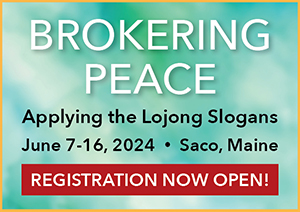 SLOGAN 48 • Train without bias in all areas. It is crucial always to do this pervasively and wholeheartedly.
SLOGAN 48 • Train without bias in all areas. It is crucial always to do this pervasively and wholeheartedly.
The previous slogan was about including all aspects of yourself in your lojong practice: your body, your speech, and your mind. This slogan expands upon that to include all aspects of your experience altogether.
Lojong practice has two components: meditation practice, which includes formless practice and tonglen, and postmeditation, which means working with the lojong slogans in everyday life. Meditation is done alone, and slogan practice takes place in our interactions with others.
This slogan is based on seeing every aspect of your life as a practice opportunity. The idea is that instead of dividing your life, considering some parts practice and the rest time off, you should view everything you do with the eyes of lojong.
If you view lojong as only something that happens on the meditation cushion, you are missing the point completely. Formal practice is great, it is important, but it is only a small portion of your life: the rest is postmeditation. In postmeditation, you are working with what happens after you get up from the cushion and you have to deal with the nitty-gritty of your life and with other people. That is where your practice is put to the test.
If you are biased and have fixed views about what it takes to be able to practice lojong, it is easy to come up with all sorts of excuses as to why it is so difficult to practice. You can complain about all the obstacles you face and how your circumstances are never quite right.
Being without bias means that there are no excuses. You do not declare any areas off limits, but you relate to your life as a single whole, a back and forth rhythm of meditation and postmeditation. When you are without bias, instead of waiting for the right occasion, you apply lojong on the spot, not matter what is going on at the time. In that way your lojong practice becomes more than a hobby or accessory—it is a way of life.
Today’s practice
The best way to develop a more wholehearted lojong practice is by 1) spending time practicing mindfulness and tonglen, and 2) memorizing some or all of the slogans. For today’s practice, focus on one or two slogans that particularly strikes you. Touch on those slogans from time to time, and notice when they come up on their own.
